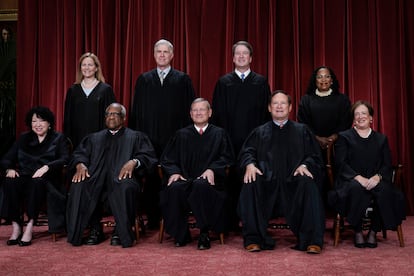Affirmative action ruling divides the Supreme Court’s Black justices
Clarence Thomas and Ketanji Brown Jackson lashed out at one another over the best way to end historical discrimination of minorities


The Supreme Court’s ruling on the end of affirmative action has left almost no one indifferent in the US. Republicans, headed by Donald Trump, have applauded the decision, while President Joe Biden, has condemned it. The conservatives have imposed their 6-3 majority in the Supreme Court to end a practice that has allowed generations of mainly Black and Latino students realize their ambitions. Curiously, it is two Black Supreme Court justices who have clashed the most sharply over the issue.
The two judges sit at opposite ends of the ideological spectrum. Clarence Thomas, 75, is one of the most conservative justices in the country and the most senior. Ketanji Brown Jackson, 52, is the latest appointment and perhaps the most left-leaning. Despite both being African-American, their positions on racial issues are diametrically opposed.
Regarding Jackson, Thomas said in his concurring opinion that “as she sees things, we are all inexorably trapped in a fundamentally racist society, with the original sin of slavery and the historical subjugation of Black Americans still determining our lives today. The panacea, she counsels, is to unquestioningly accede to the view of elite experts and reallocate society’s riches by racial means as necessary to ‘level the playing field,’ all as judged by racial metrics. I strongly disagree.”
Jackson struck back at Thomas, saying, “He does not dispute any historical or present fact about the origins and continued existence of race-based disparity (nor could he), yet is somehow persuaded that these realities have no bearing on a fair assessment of ‘individual achievement.’ Justice Thomas’s opinion also demonstrates an obsession with race consciousness that far outstrips my or the University of North Carolina’s holistic understanding that race can be a factor that affects applicants’ unique life experiences. The takeaway is that those who demand that no one think about race (a classic pink-elephant paradox) refuse to see, much less solve … the race-linked disparities that continue to impede achievement of our great Nation’s full potential.”

The two judges are not the only ones at loggerheads. In the political realm, President Joe Biden has lambasted the decision. “I believe our colleges are strongest when they are racially diverse,” he said. “I also believe that while talent, creativity, and hard work are everywhere across this country, not [so] equal opportunity. It’s not everywhere across this country.” He went on to repeat three times, “Discrimination still exists in America. Discrimination still exists in America. Discrimination still exists in America. Today’s decision does not change that. It’s a simple fact.”
Biden proposes taking advantage of an ambiguity in the decision which would allow colleges to consider the obstacles a student has overcome compared to more qualified applicants. “We cannot let this decision be the last word,” he insisted. “Our nation’s colleges and universities should be engines of expanding opportunity through upward mobility. But today, too often that’s not the case. Today, for too many schools, the only people who benefit from the system are the wealthy and the well-connected. The odds have been stacked against working people for much too long,” he added.
Closing ranks
On the other side of the divide was deafening applause from Trump and the rest of the Republicans. “This is a great day for America,” Trump wrote on his social media platform, Truth Social, adding, “People with extraordinary ability and everything else necessary for success, including future greatness for our country, are finally being rewarded. This is the ruling everyone was waiting and hoping for and the result was amazing. It will also keep us competitive with the rest of the world. Our greatest minds must be cherished and that’s what this wonderful day has brought. We’re going back to all merit-based—and that’s the way it should be!”
Three of the six judges who voted in favor of eliminating affirmative action based on race were appointed by Trump during his four-year presidency.
Other Republicans have chosen to take the same line. “College admissions should be based on merit and applicants should not be judged on their race or ethnicity,” said Ron DeSantis, Trump’s chief rival in the 2024 presidential primary. “The Supreme Court has correctly upheld the Constitution and ended discrimination by colleges and universities.”
Meanwhile, Kevin McCarthy, speaker of the House of Representatives, spoke out in a similar vein: “Now students will be able to compete based on equal standards and individual merit. This will make the college admissions process fairer and uphold equality,” he said in a tweet.
Vivek Ramaswamy, a primary candidate of Asian origin, has also been adamant about the fairness of the decision. “The majority of Black students at Harvard are not descendants of slaves but descendants of immigrants. Giving special preferences to someone who ‘looks like’ a person who once suffered is not justice. We should finally embrace colorblind meritocracy in America rather than repeat our past mistakes,” he said.
Tim Scott, the only Black Republican senator and also a candidate for the 2024 presidential election, also weighed in with: “This is the day where we understand that being judged by the content of our character, not the color of our skin, is what our constitution wants,” adding the decision is something the country should “celebrate.”
In contrast, Democrat and House Minority Leader, Hakeem Jeffries, an African-American and member of the Congressional Black Caucus, criticized the ruling, calling the Supreme Court’s conservative justices “right-wing ideologues” who “gutted reproductive freedom last year.” He went on to say, “The very same extremists just obliterated consideration of racial diversity in college admissions. They clearly want to turn back the clock. We will NEVER let that happen.”
Sign up for our weekly newsletter to get more English-language news coverage from EL PAÍS USA Edition
Tu suscripción se está usando en otro dispositivo
¿Quieres añadir otro usuario a tu suscripción?
Si continúas leyendo en este dispositivo, no se podrá leer en el otro.
FlechaTu suscripción se está usando en otro dispositivo y solo puedes acceder a EL PAÍS desde un dispositivo a la vez.
Si quieres compartir tu cuenta, cambia tu suscripción a la modalidad Premium, así podrás añadir otro usuario. Cada uno accederá con su propia cuenta de email, lo que os permitirá personalizar vuestra experiencia en EL PAÍS.
¿Tienes una suscripción de empresa? Accede aquí para contratar más cuentas.
En el caso de no saber quién está usando tu cuenta, te recomendamos cambiar tu contraseña aquí.
Si decides continuar compartiendo tu cuenta, este mensaje se mostrará en tu dispositivo y en el de la otra persona que está usando tu cuenta de forma indefinida, afectando a tu experiencia de lectura. Puedes consultar aquí los términos y condiciones de la suscripción digital.








































